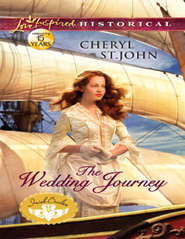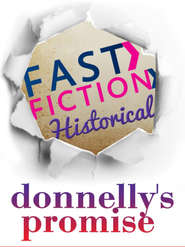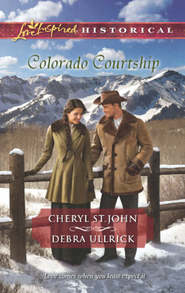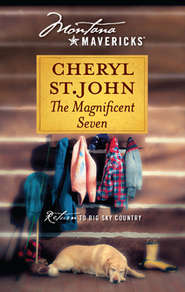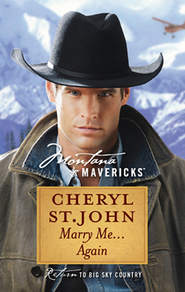По всем вопросам обращайтесь на: info@litportal.ru
(©) 2003-2025.
✖
Sequins and Spurs
Настройки чтения
Размер шрифта
Высота строк
Поля
“That must’ve pained you,” she said to the closed door. She doggedly washed the dishes, wiped the table and hung the towels to dry, before pouring a pitcher of water and heading upstairs, exhausted.
The silent house yawned in the falling darkness. In her mother’s old room, Ruby stripped off her clothing, washed her face and sponged her body before unfolding a cotton gown and dropping it over her head. She touched the fabric, brought it to her face and inhaled, hoping to find a trace of her mother in its clean folds. The scents of lavender and sunshine were pale reminders. She sat in the corner chair and surveyed the room she’d so carefully scrubbed and waxed.
“I’m sorry, Mama.” The silent room absorbed her voice. “I wanted to make it up to you—all the years I was gone. I hoped you’d forgive me and let me try to start over with both you and Pearl.” Ruby let her gaze touch the molding around the ceiling. “If you missed me half as much as I miss you now, I know how bad it was. I’m glad you had Pearl.”
She didn’t want to think about how hard it must have been on her ill mother when Pearl was killed. “Your room looks real pretty. I’m going to get the rest of the house just the way you like it, too.”
When she could no longer keep her eyes open, Ruby stretched out on the bed and fell into an exhausted sleep.
* * *
In the glow of a lantern, Nash opened the stall door and studied the magnificent horse Ruby called the Duchess. It was his job to know horses, and he recognized this breed from a livestock exhibition he’d attended a few years ago. While they weren’t as perfectly proportioned as Thoroughbreds, Barbs were agile and fast, second only to Arabians as one of the oldest breeds in existence. Nash had saved for a long time to buy a Thoroughbred to improve his stock. He knew an expensive horse when he saw one.
Contemplating how Pearl’s sister had come by this one puzzled him to no end. He didn’t know of anyone in the country who bred or sold them. He ran a palm down over the mare’s bony forehead, and she twitched an ear.
Everything he thought he’d known about Ruby Dearing was being turned upside down. Pearl had never spoken ill of her, but Pearl never spoke ill of anyone. A few years after their father had deserted them, Ruby had hightailed it out of their lives as well. What drove a person to leave their family behind and disappear?
He’d been young once, frustrated by his father’s expectations that he work at the mill in hopes of one day taking over. Nash had told his father that he wanted something else—that he wanted to raise horses—but his father had turned a deaf ear. Cosmo Sommerton’s own dream of building a milling operation and leaving it as a legacy kept him from recognizing or appreciating his son’s ambition.
The few times during his youth that Nash had approached his father about going out on his own, Cosmo had become so upset Nash had backed down. He’d still been working at the mill when he was in his twenties. Through church activities he and Pearl had struck up a friendship.
Nash stroked the Duchess’s shiny neck and patted her solid withers. “You’re a beauty, all right.”
The horse nickered. It had been no secret that Pearl and her mother were looking for someone to take over the operation of their farm. They could no longer afford to pay hands to do all the work, and had come to the place where they were forced to sell or combine efforts with another owner.
Pearl had been one of the prettiest young women in the community. She was a sweet thing, devoted to her mother and a volunteer at church. There were plenty of fellows willing to court and marry her, but she hadn’t given anyone the time of day until she and Nash became better acquainted.
Nash had taken his share of girls to local dances, but the idea of marrying one had made his future at the mill less and less appealing. If he had a wife—and most likely a young family—he’d be stuck there forever.
One evening he had shared with Pearl his hopes for having a ranch. After talking to her mother, she’d approached him a few days later with the offer of turning the Dearing farm into a ranch. The land was there, the buildings, even fertile fields for hay and alfalfa. Everything he needed for a start. He’d set aside some savings, which he could use to buy horses.
Nash let himself out of the stall and checked on the mares as he made his way toward the front of the stable.
As he’d pondered it over, knowing without a shadow of a doubt that he wanted that land, he’d considered his father’s reaction. Nash had thought about their future living arrangements—and how everything would be more suitable and proper if he and Pearl married. His father would likely be more tolerant of Nash’s choice if love was involved.
And so he’d proposed, and Pearl had cheerfully accepted. They’d made the best choice for everyone concerned, and Nash had his ranch.
It had been easy to love Pearl. She was kind and loving and never complained, even when he worked long hours and spent nights in the barn with foaling mares. She had Laura for company, and later the children kept her busy.
In his heart, though, Nash sometimes feared he’d cheated her. He’d always planned that there would be time to make it up to her, time when they could take trips and he could lavish attention on her as she deserved.
But the horses always needed his attention. And then Laura had become ill, and Pearl had devoted more of her time to her mother. Nash recalled one evening in particular, when he’d entered the house after dark and Pearl had still been in the kitchen. The sweet smell of peaches hung heavy in the air. A dozen Mason jars sat cooling on the table, and his wife was washing an enormous kettle. She set it on the stove when she’d dried it, and turned to greet him with a weary smile.
“Are you hungry?”
“I ate with the hands.”
“Maybe a dish of peaches then?” One slender strand of hair had escaped the neat knot she always wore, and touched her neck. She tucked it back in place.
“You need your rest.” He stepped close and reached behind her to untie her apron. He hung it over the back of a chair. “Go on upstairs. I’ll bring water.”
The image faded in Nash’s mind. He had more and more trouble remembering their exchanges, especially with Ruby here. Ruby’s vibrant presence overwhelmed his senses.
Was that why he had so much trouble accepting her? Because she made him feel as though he was losing another part of himself? Just by being here she pointed out things he didn’t want to admit.
Ruby had been making a visible effort to ingratiate herself. She had taken some pretty harsh news and done her best with it, all things considered. He couldn’t argue about her right to be here. He didn’t have to approve of what she’d done in the past.
When he thought about the situation like that, he went back over his decisions. What would Pearl want him to do? What would Laura expect? He extinguished the last lantern and looked toward the darkened house.
He owed it to Pearl to give Ruby a chance.
Chapter Six (#ulink_d569f560-294c-5808-8608-0b253e2bc482)
The following morning, she was awakened by Nash’s voice shouting up the stairs. “Ruby!”
“What did I do now?” she grumbled, climbing out of bed and tugging on a wrapper. She padded to the head of the staircase and looked down. “Good morning.”
He stood in the entryway, looking upward. “Dugger and I are ready to move furniture before we head out to check stock.”
She darted back the way she’d come. “I’ll be right down!”
She had no idea what had changed his mind, but she was thankful. A glance in the mirror made her laugh. Her hair had a life of its own, and mornings weren’t her best. She could only imagine what Nash had thought.
She pulled on one of her mother’s brown skirts and a lightweight shirtwaist, found her shoes and tugged her obstinate hair into a tail.
Dugger handed her a cup of coffee as she landed at the bottom of the staircase. “Nash made a pot. Didn’t know if you like it sweet or not, so it’s black.”
She noted the front door had been propped open with a length of wood. “Black is perfect, thank you.”
She blew on the steaming cup, took a sip and steadied the coffee as she followed him to the parlor.
“How many rooms do you want to do?” Nash asked. “We can carry out the dining room furniture, too, if you like.”
“I would appreciate that. I’ll go take dishes out of the china cabinet.”
He nodded and set to work. Within forty-five minutes, two rooms of furniture had been moved to the porch and the front yard. Her mother’s dishes sat in neat stacks along one wall of the hallway.
“Is there a wagon I can use to bring supplies from town?” Ruby asked Nash before he could leave. “I’ll hitch up my own horse.”
He gave her a hesitant nod. “I’ll move the buckboard out where you can get to it. Might want to introduce your mare to the big bay in the corral. He’s good as the other half of a team. Doesn’t spook easily.”
Because Pearl’s death had occurred when a wagon turned over, Ruby’s question probably stirred up those memories.
“What’s his name?”
Nash gave her a surprised look. “Boone.”
“Thanks.”






